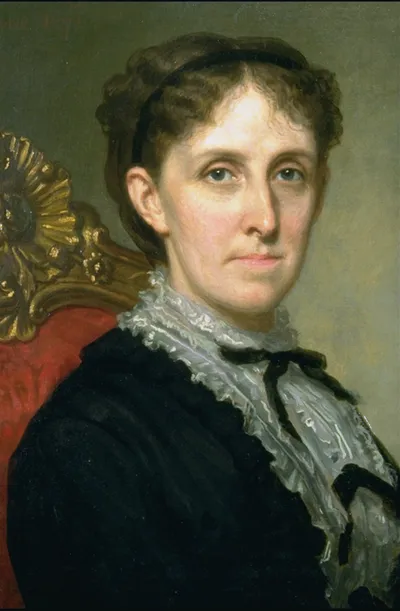Come and watch Little Women (2019) presented by the Poe Museum and Good For Her Films on November 22nd at 5:45pm. Purchase tickets here.
Edgar Allan Poe and Louisa May Alcott have left an equally enduring impact on the American literary canon, however, on the surface their anthologies could not be more different. Poe, the “Master of the Macabre,” focused on the horrid nature of 19th century life while Alcott took inspiration from the warmth of her own life paralleled against the Civil War. However, when we dig deeper, perhaps the lives of these two writers intersected in more ways than one.
Both Poe and Alcott spent their early childhoods in Boston, Massachusetts. Poe was born in a boarding house on 62 Charles Street. Shortly after Alcott was born, her family moved to Boston, just blocks from where Poe spent the first years of his life. While both had roots in Massachusetts, their upbringings could not be more different. Poe was orphaned at the age of three after his father abandoned him, and his mother passed away from tuberculosis. Poe was taken in by a foster family, the Allans, and raised amongst the Southern aristocracy in Richmond. Alcott, however, grew up in Massachusetts with her father Amos, mother Abigail, and three sisters. The Alcotts struggled with poverty throughout Louisa’s childhood, prompting her to seek several jobs to support her family. One of these jobs was acting. Although Poe himself never acted, he always found pride in himself as the son of actors, or “players of the stage.” While their upbringings differed, both used their early childhoods as a source of inspiration for their literature.
The Alcotts embedded themselves in the transcendentalist movement. In Concord, Massachusetts, the family neighbored notable transcendentalist writers such as Ralph Waldo Emerson and Henry Thoreau. Alcott was close to both Emerson and Thoreau. Her first collection of poems, Flower Fables, were poems she first told Emerson’s daughter, Ellen. Alcott’s transcendentalist upbringing influenced many of her views as an adult. She was a staunch abolitionist and was close to other abolitionists including Fredrick Douglass, William Llyod Garrison, and John Brown.
Poe, on the other hand, famously despised the Transcendentalist movement. He critiqued the works of Emerson and even Louisa’s father, Amos Alcott:
Let him mend his pen, get a bottle of visible ink, come out from the Old Manse, cut Mr. Alcott, hang (if possible) the editor of “The Dial”, and throw out of the window to the pigs all his odd numbers of “The North American Review.”1
AMONG all the pioneers of American literature, whether prose or poetical, there is not one whose productions have not been much overrated by his countrymen. But this fact is more especially obvious in respect to such of these pioneers as are no longer living, — nor is it a fact of so deeply transcendental a nature as only to be accounted for by the Emersons and Alcotts.2
Poe, unlike Alcott, was a pro-Southern anti-abolitionist. Alcott served as a nurse during the Civil War and expressed disdain at the possibility of caring for a Confederate soldier. During Poe’s time at the Southern Literary Messenger, Poe reviewed several pro-slavery publications and criticized abolitionists such as James Russell Lowell.3
Alcott and Poe, while not too similar in their personal lives, found similarities amongst their literature. Both Poe and Alcott read gothic literature at a young age which influenced their literature. Poe studied Milton, Walpole, and Radcliffe; Alcott the Bronte sisters — and perhaps even Poe himself. Alcott’s first novel, The Inheritance, was heavily influenced by Jane Eyre. Both of their literary careers began with published poetry written during their childhood. For Poe, it was Tamerlane published when he was 18; for Alcott, it was Flower Fables at age 22. Even as their careers developed, both wrote in the mystery or thriller genre. Poe invented the detective story in 1841 with The Murders in the Rue Morgue. Alcott, under the pseudonym A.M. Barnard wrote another one of the earliest known thriller stories, Behind a Mask. While Poe and Alcott never met, they were certainly involved in the same 19th century literary sphere. Both attended Anne Lynch’s literary salon (Alcott attended after Poe’s death) where authors such as Osgood, Emerson, Melville, and Hawthorne appeared. Though their lives and ideologies often stood in stark contrast, Poe and Alcott shared a devotion to exploring the depths of human experience, each leaving a lasting mark on American literary canon.
1 Edgar Allan Poe, “Tale-Writing — Nathaniel Hawthorne” [Text-01], Godey’s Lady’s Book, November 1847,
pp. 252-256 https://www.eapoe.org/works/criticsm/glb47hn0.htm
2 Edgar Allan Poe (ed. J. A. Harrison), “A Few Words About Brainard,” The Complete Works of Edgar Allan Poe
— Vol. XI: Literary Criticism – part 04 (1902), 11:15-24
https://www.eapoe.org/works/harrison/jah11c04.htm#pg0015. Poe also mentions Alcott in Edgar Allan Poe (ed. J. A. Harrison), “Our Amateur Poets, No. III. — William Ellery Channing,” The Complete Works of Edgar Allan Poe — Vol. XI: Literary Criticism – part 04 (1902) and Edgar Allan Poe (ed. J. A. Harrison), “About Critics and Criticism,” The Complete Works of Edgar Allan Poe — Vol. XIII: Literary Criticism – part 06 (1902), 13:193-202.
3 Edgar Allan Poe (ed. J. A. Harrison), “Review of A Fable for the Critics,” The Complete Works of Edgar Allan
Poe — Vol. XIII: Literary Criticism – part 06 (1902), 13:171-172.

